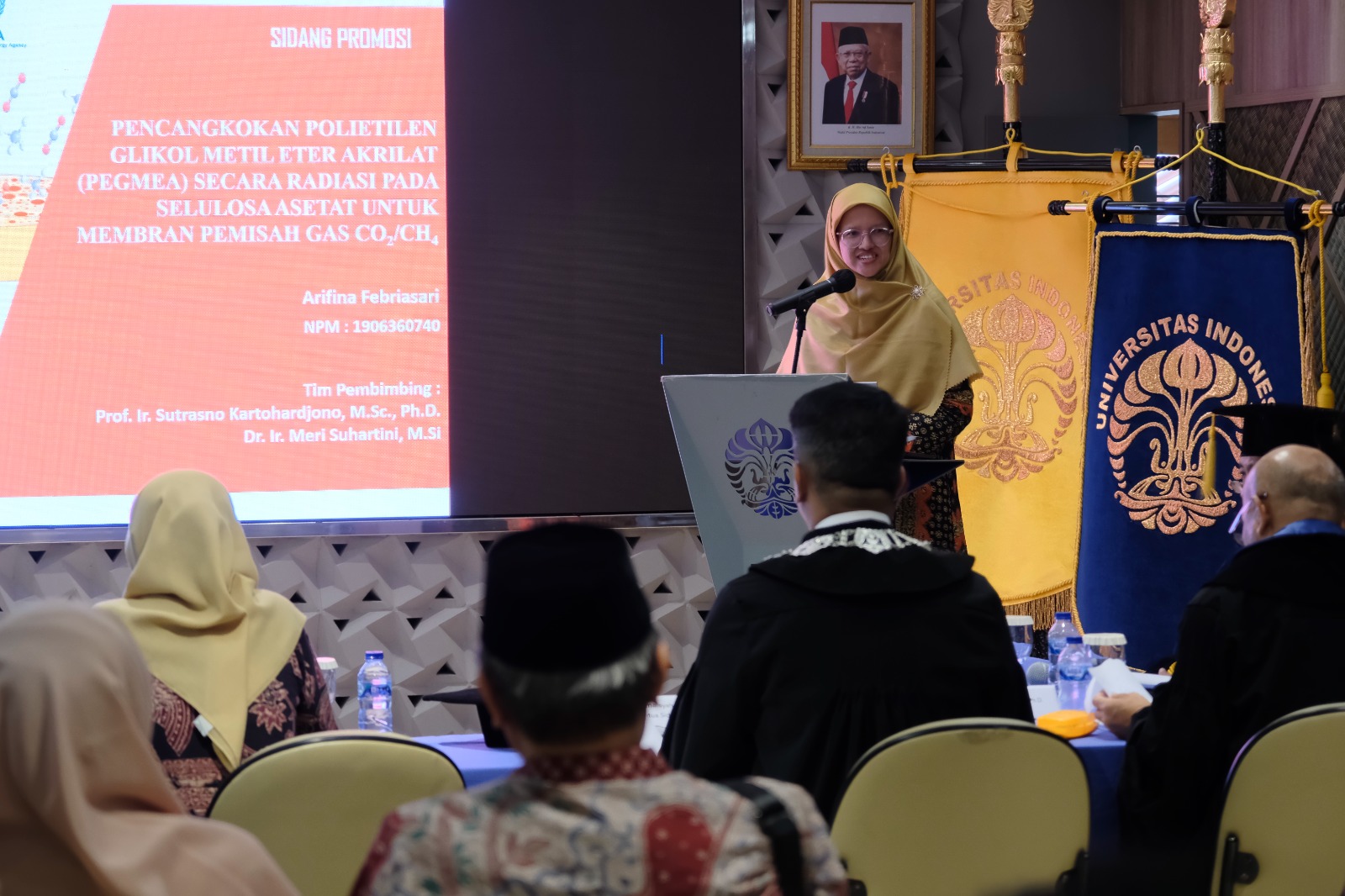Natural gas is the most widely used energy source, so it is very important to supply energy around the world. Natural gas consists of several hydrocarbon gases and about 20–30% of natural gas reserves are estimated to be acidic due to the presence of carbon dioxide in them. In Indonesia, the content of CO2 gas in natural gas reaches 71% on Natuna Island, which is one of the largest natural gas producers in Indonesia.
The high CO2 content in natural gas can reduce engine power and the natural gas combustion rate. In addition, CO2 gas can also cause corrosion in piping and other equipment. Separating CO2 gas from CH4 is important to minimise the negative effects of CO2 contained in natural gas. Therefore, it is necessary to separate CO2 gas from natural gas before the gas distribution process so that it meets the expected quality.
This sparked a student from the Doctoral programme in the Department of Chemical Engineering, Faculty of Engineering, Universitas Indonesia (DTK FTUI) to do further research through his dissertation entitled “Radiated Grafting of Polyethylene Glycol Methyl Ether Acrylate (PEGMEA) on Cellulose Acetate for CO2/CH4 Gas Separating Membranes”. This dissertation was presented at the FTUI DTK Doctoral promotion session on Tuesday, July 23.
Arifina’s research uses membrane technology to produce low energy consumption. In addition, the selection of cellulose acetate (CA) as a polymer material used for CO2 gas separation is a potential basic polymer membrane because the fabrication process is easy, environmentally friendly, and more economical.
“This study aims to modify the CA membrane to become a Fixer Carrier Membrane (FCM) with the addition of polyethene glycol (PEG) and polyethylene glycol n-methyl ether acrylate (PEGMEA) as membrane-active substances to increase CO2 gas permeability in the membrane. CA-PEGMEA membrane production is carried out by a mixing process followed by simultaneous administration of gamma-ray irradiation so that graft complementation occurs between CA and PEGMEA, thus increasing the efficiency of CO2 gas separation,” said Arifina Febriasari.
Arifina Febriasari further revealed that this research can be applied at low pressure, so it does not require very high costs and has a membrane that has high selectivity because the presence of PEG and PEGMEA can increase the solubility of CO2 and the selectivity of CO2 to CH4 so that the pressure needed is not larger than the one without modification.
Dean of FTUI, Prof. Dr. Heri Hermansyah, S.T., M.Eng., IPU, said, “With the development of a membrane made from cellulose acetate for the separation of CO2 gas in this binary mixed gas, it can be seen that it produces an effective CO2/CH4 separation, so it is hoped that in the future it can be developed further so that it can be applied in the natural gas producing industry, and further studies are carried out to test the performance of the membrane against other impurities in natural gas besides CO2.”
Arifina Febriasari earned her Doctorate with a perfect GPA of 4.00 and a Cum Laude predicate held by the Faculty of Engineering, Universitas Indonesia. He is the 66th Doctor who graduated from the Chemical Engineering Department and the 515th doctor at FTUI. The Doctoral Promotion Session was chaired by the Chairman of the Session, Prof. Dr. Heri Hermansyah, S.T., M.Eng., with promoter Prof. Ir. Sutrasno Kartohardjono, M.Sc., PhD., and co-promoter Dr. Ir. Meri Suhartini, M.Sc., and the team of examiners Prof. Dr. Ir. Nelson Saksono, M.T., Prof. Dr. Yenny Meliana, S.T., M.T., Dr. Eva Fathul Karamah, S.T., M.Eng.
***
Bureau of Public Communications
Faculty of Engineering, Universitas Indonesia

